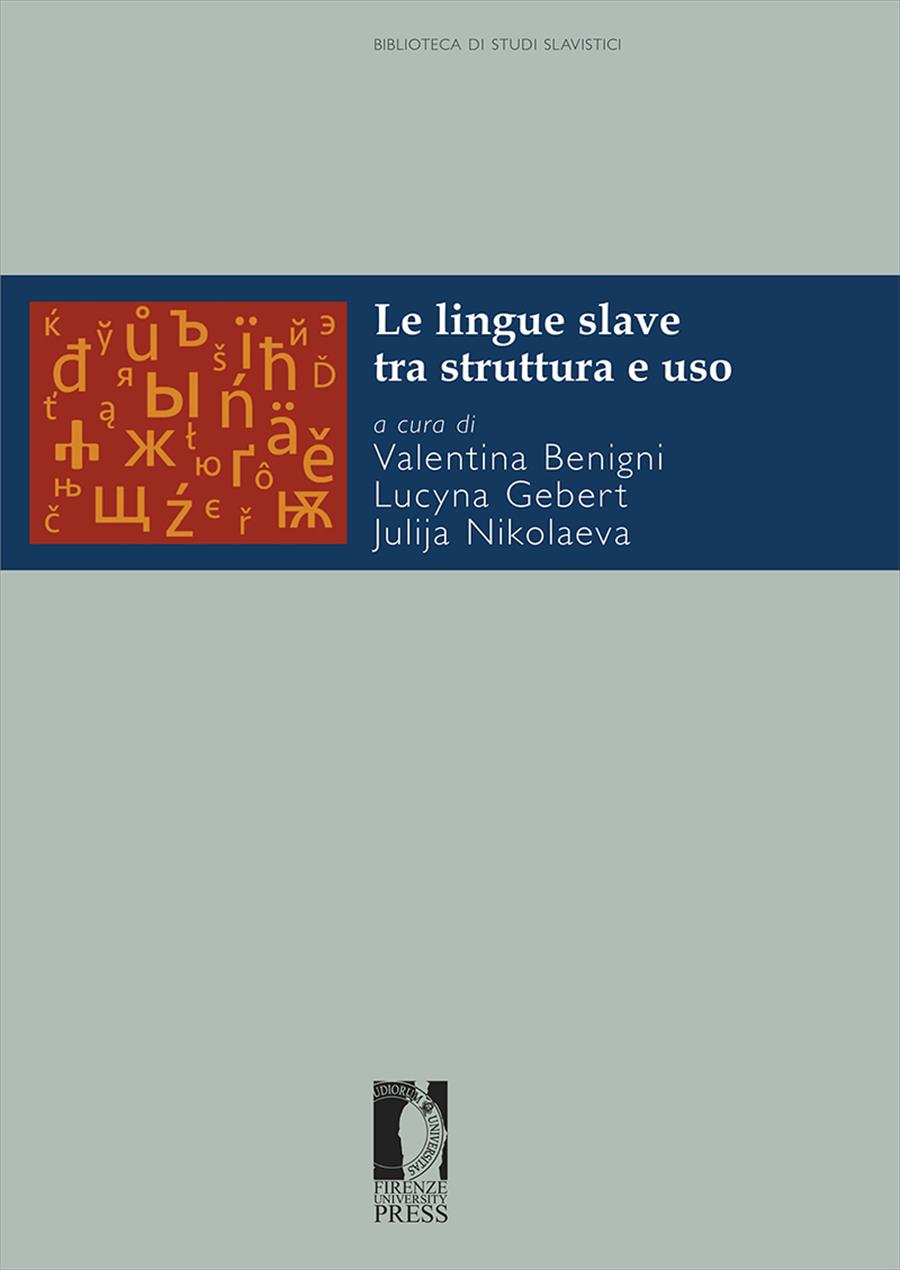- Le lingue slave tra struttura e uso
- Edited by Valentina Benigni, Lucyna Gebert, Julija Nikolaeva
Changes and Developments in the Linguistic Landscape of Present-Day Crimea
- Paola Bocale
- © 2016 Author(s) |
- CC BY 4.0
- DOI: 10.36253/978-88-6453-328-5.04
Following Crimea’s incorporation into Russia in March 2014, the Crimean parliament adopted a new constitution granting official status to Russian, Ukrainian and Crimean Tatar. Despite the official multi-ethnicity and multilingualism of Crimea now constitutionally acknowledged, however, there is reason to believe that the formally proclaimed equality of the three languages has not translated into equality in practice. Among the areas where the inequality in language promotion and support is most noticeable, language education policy and language use in public place play a special role.
- Keywords:
- Crimea,
- Russia Language Policy,
- Minority Languages,
- Language Revitalization,
Univertity of Insubria, Italy - ORCID: 0000-0001-5790-990X
- “Krym. Realii”, 18.02.2015, <http://ru.krymr.com/content/article/26856821.html> (last accessed: 23.02.15).
- Ablaeva N. (2015) - Èto kak stroit’ dom bez fundamenta. O problemach obrazovanija na krymskotatarskom jazyke,
- Alòs i Font H. (2014) - Chuvash Language in Chuvashia’s Instruction System: An Example of Educational Language Policies in Post-Soviet Russia, “Journal on Ethnopolitics and Minority Issues in Europe”, XIII, 4, 52-84.
- Bilaniuk L. (2005) - Contested Tongues. Language Politics and Cultural Correction in Ukraine, Ithaca.
- Bocale P. (2015) - Italian, Ukrainian or Russian? Language and Identity in Crimea, “Journal of Multilingual and Multicultural Development”, XXXVI, pp. 620-637.
- Charnysh V. (2013) - Analysis of Current Events: Identity Mobilization in Hybrid Regimes: Language in Ukrainian Politics, “Nationalities Papers”, XLI, 1-14.
- Grenoble A. (2003) - Language Policy in the Soviet Union, Dordrecht.
- Hogan-Brun G., Melnyk S. (2012) - Language policy management in the former Soviet sphere, in B. Spolsky (ed.), The Cambridge Handbook of Language Policy, Cambridge, 592-616.
- Izmirli I.P. (2012) - On Revitalization of the Language and Culture of the Crimean Tatars and Other Formerly Deported People in Crimea. Ukraine: Assessment of Needs and Recommendations, in Social Science Research Network, OSCE High Commissioner on National Minorities (HCNM), Vienna, cf. <http://papers.ssrn.com/sol3/papers.cfm?abstract_id=2308866> (last accessed:15.12.14).
- Kaplan R., Baldauf R. (1997) - Language Planning from Practice to Theory, Clevedon.
- Khaleeva I. (2006) - Teaching National Languages in Russia, paper presented at the conference ‘Towards a Common European Framework of Reference for Languages of School Education?’, Jagiellonian University, Krakow, cf. <https://www.coe.int/t/dg4/linguistic/Source/Khaleeva-paper.doc> (last accessed: 23.03.15).
- Lubaś W. (2009) - Polityka językowa, Opole.
- Marquardt K.L. (2012) - Stabilization and Symbolism: Language and Regional Politics in the Chuvash Republic, “Nationalities Papers”, XL, 127-147.
- Pavlenko A. (2013) - Language Management in the Russian Empire, Soviet Union, and Post-Soviet Countries, in R. Bayley, R. Cameron, C. Lucas (eds.), The Oxford Handbook of Sociolinguistics, Oxford, 652-679.
- Protassova E., Alòs i Font H., Bulatova E. (2014) - Education in Udmurt and Chuvash as Minority Languages of Russia, “InterDisciplines”, V, 1-33.
- Pylypenko T. (2004) - Realizacija osvitnich potreb predstavnykiv nacional’nych menšyn v Ukraїni: stan, problemy, perspektyvy, in Ju. Tyščenko (ed.), Aktual’ni pytannja vitčyznjanoї etnopolityky, Kyjiv, 53-89, cf. <www.ciet.org.ua/docs/sbornik/234-252_pilipenko.doc> (last accessed: 20.04.15).
- Pyykkö R. (2010) - Language Policy as a Means of Integration in Russia, in M. Lähteenmäki, M. Vanhala-Aniszewski (eds.), Language Ideologies in Transition: Multilingualism in Russia and Finland, New York, 81-100.
- Sasse G. (2007) - The Crimea Question: Identity, Transition and Conflict, Cambridge (MA).
- Schlyter B.N. (2012) - Multilingualism and Language Renewal in Ex-Soviet Central Asia, in T.K. Bhatia, W.C. Ritchie (eds.), The Handbook of Bilingualism and Multilingualism, Chichester, 871-898.
- Shevchenko V. (2015) - Crimean Tatar Media ‘Silenced by Russia’, “BBC Monitoring”, 01.04.2015, <http://www.bbc.co.uk/news/world-europe-32145218> (last accessed: 22.09.15).
- Shohamy E. (2006) - Language Policy: Hidden Agendas and New Approaches, Abingdon.
- Spolsky B. (2009) - Language Management, Cambridge.
- Uehling G. (2004) - The First Independent Ukrainian Census in Crimea: Myths, Miscoding, and Missed Opportunities, “Ethnic and Racial Studies”, XXVII, 149-170.
- Ulasiuk I. (2011) - Legal Protection of Linguistic Diversity in Russia: Past and Present, “Journal of Multilingual and Multicultural Development”, XXXII, 71-83.
- Veinguer A.Á. (2013) - “Mutual Understanding” in Tatarstan? Teachers’ and Pupils’ Attitudes to Tatar and Russian in Tatar and Non-Tatar Gymnásias, “Pragmatics and Society”, IV, 240–257.
- Zamyatin K. (2012) - From Language Revival to Language Removal? The Teaching of Titular Languages in the National Republics of Post-Soviet Russia, “Journal on Ethnopolitics and Minority Issues in Europe”, XI, 2, 75-102.
Chapter Information
Chapter Title
Changes and Developments in the Linguistic Landscape of Present-Day Crimea
Authors
Paola Bocale
Language
Italian
DOI
10.36253/978-88-6453-328-5.04
Peer Reviewed
Publication Year
2016
Copyright Information
© 2016 Author(s)
Content License
Metadata License
Bibliographic Information
Book Title
Le lingue slave tra struttura e uso
Editors
Valentina Benigni, Lucyna Gebert, Julija Nikolaeva
Peer Reviewed
Number of Pages
346
Publication Year
2016
Copyright Information
© 2016 Author(s)
Content License
Metadata License
Publisher Name
Firenze University Press
DOI
10.36253/978-88-6453-328-5
ISBN Print
978-88-6453-327-8
eISBN (pdf)
978-88-6453-328-5
eISBN (xml)
978-88-9273-230-8
Series Title
Biblioteca di Studi Slavistici
Series ISSN
2612-7687
Series E-ISSN
2612-7679
